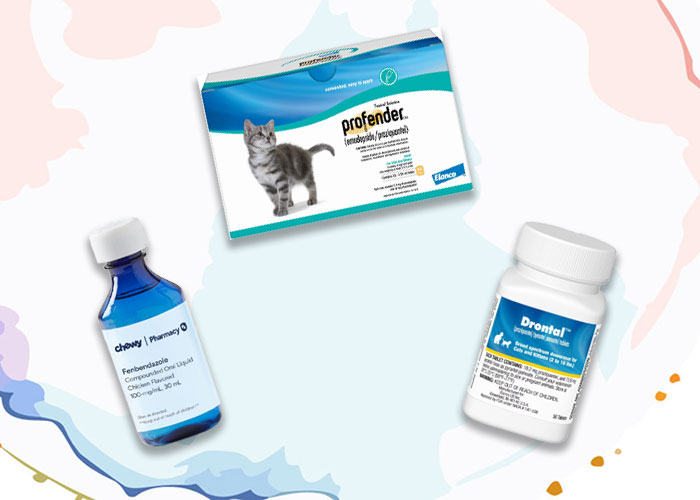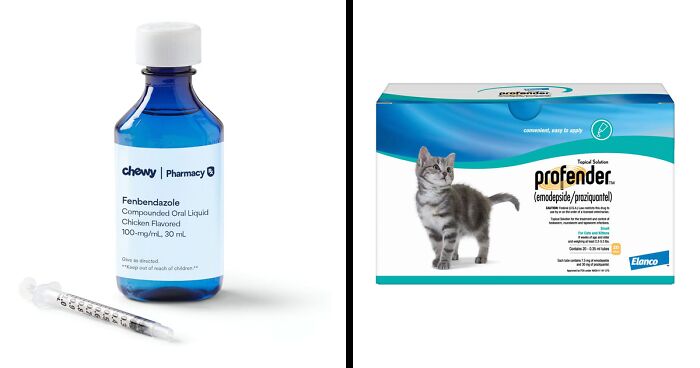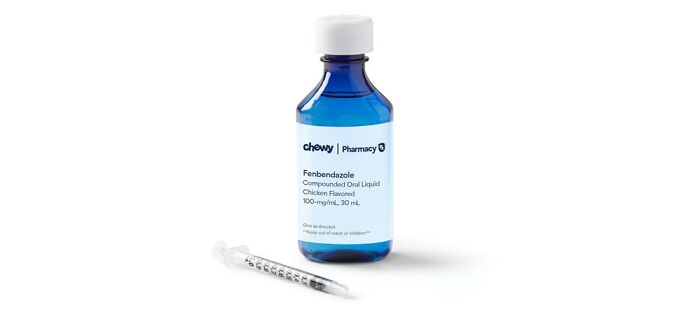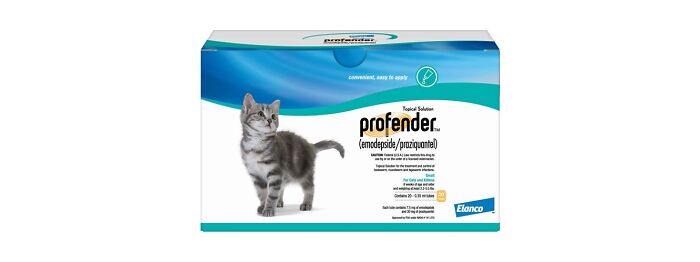If you suspect your cat has worms, it’s best to act quickly, as these parasites can cause serious harm if left untreated. Deworming is the best way to eliminate worms and prevent future infections. However, using the right dewormer for your cat or kitten is essential. 
Luckily, you can usually purchase the dewormer needed to treat the most common intestinal worms (tapeworm and roundworm) over the counter without requiring a prescription or vet visit. If you need a more broad-spectrum dewormer, your best bet is to contact your vet for guidance.
To simplify things, Bored Panda compiled a list of top-performing dewormers that our vet expert, Dr. Linda Simon, has personally tested and recommended. You can trust these products to be effective and safe for your feline friend. But remember: There’s no one-size-fits-all solution, so spend enough time investigating the best solution for your pet.
The information provided herein is for informational purposes only. Please refer to our disclaimer for more details.
Best Dewormers for Kittens
You’ll want to provide a broad-spectrum option for your kitten, and lots are available over the counter to treat the most common intestinal parasites. Make sure you choose one that is safe for kittens and appropriate for your kitty’s age and weight. Many have restrictions, such as only being suitable for those over two weeks old or those weighing over one kilogram.
This post may include affiliate links.
Fenbendazole Oil (Panacur)
This wormer is the go-to choice for most kitten owners. You can find it in liquid, paste, or granule form, and it works wonders against both roundworms and tapeworms. Moreover, it’s also an effective dewormer for hookworm, whipworm, and some protozoal infections.
One of the best things about this wormer is that it can be tailored to the kitten’s size, making it an incredibly safe option. However, some owners might find it tricky to measure the doses correctly, mainly if they’re not used to it.
Tip: Since kittens must be dewormed every three weeks from birth, buying a large bottle of Fenbendazole liquid might be a good idea if you have a litter. This way, you can dose the litter until they’re ready for their new homes.
What we like:
• High safety index
• It can be used for very young kittens
• One of the broadest acting wormers available
• No prescription needed
What we don't like:
• Some owners find measuring doses tricky
• Not all kittens will like the taste
• Feeding can get a bit messy
Best Tablet Dewormers
Using tablet dewormers with cats has some advantages. Tablets are pre-measured, and some cats can easily swallow them. However, crushing and mixing the tablets with food can sometimes release a bitter taste, which may make it difficult for the cat to eat. To make it palatable, warm up the food and add something extra tasty, like fish or chicken, to encourage your cat to eat it all.
Vet Recommends: We recommend using a Lixit Pill Popper as it makes administering tablets a much easier task.
Drontal
Drontal is a medication containing praziquantel and pyrantel pamoate as active ingredients. These two work to eliminate hookworms, roundworms, whipworms, and tapeworms in adult cats. The tablets can be halved to accommodate a cat’s weight if necessary.
Please note that Drontal should not be given to pregnant cats as it has not been tested for safety in such cases. Also, it isn't recommended for kittens under six weeks of age. On the other hand, it is ideal for use by nursing queens.
What we like:
• Scored tablets for easy dosing
• Can be given whole or crumbled up
• Effective and broad-acting
What we don't like:
• Not every cat will eat tablets
• Can’t be used in kittens six weeks or under
• Not safe during a cat’s pregnancy
Droncit
Droncit is highly effective against tapeworms, but unlike other wormers, it has a narrower range of action. It is commonly prescribed alongside another parasite-preventative medication. The active ingredient in Droncit is Praziquantel, a preferred drug for treating confirmed Echinococcus infections.
Cats are most commonly infected by tapeworms when they have fleas. Fleas serve as intermediate hosts, and when the cat grooms itself, it may eat the infected flea. The larva can then develop into an adult tapeworm within the feline host. To completely get rid of tapeworms, the fleas must be targeted separately.
What we like:
• Simple and affordable
• A small pill that can be crushed
What we don't like:
• Treats only tapeworms
• Not suitable for cats of all ages
Best topical broad-acting cat dewormers
The creation of topical dewormer is a boon for cat owners who have trouble administering pills to their furry friends. Some cats are impossible to pill, leaving topical dewormer the only viable option.
Note: To prevent the cat from ingesting the medicine when licking, apply a dewormer high on the back. If ingested, your feline friend may experience mild, short-lived symptoms like drooling, nausea, and vomiting.
Profender
Profender is excellent for treating your furry friend’s parasites. It’s a topical therapy that comes in different doses—based on your cat’s weight—and is applied directly to the skin.
The active ingredients, emodepside, and praziquantel, are absorbed and transported through the bloodstream, effectively treating tapeworms, roundworms, hookworms, and lungworm infestations.
Note: This isn't an over-the-counter medication, so your cat must be personally assessed and weighed before administration.
What we like:
• Broad acting
• Easy to apply
• Adapted to your pet’s size
What we don't like:
• Requires a veterinary prescription
• Some cats dislike the smell and cold sensation
Best Oral Dewormer for Roundworms
We only need to focus on preventing or treating cat roundworms in certain situations. These cases may include roundworm infestations or when the cat is already receiving regular treatment for other common parasites.
Usually, roundworms are an issue with young kittens. For that reason, it’s absolutely essential to have a product that can be accurately measured and administered orally.
Hartz Ultraguard
Hartz Ultraguard medication could be ideal if you’re searching for a prescription-free oral liquid solution to deworm your kitten. It contains Piperazine as the active ingredient, which is safe for use in kittens. You should repeat the dose every 2-3 weeks from the age of two weeks.
You can give the liquid directly into the kitten’s mouth using a syringe or add it to their food if they’re already weaned. It’s important to note that you shouldn’t use this medication along with Pyrantel as it can interfere with its effectiveness.
What we like:
• Safe to use from just a few weeks of age
• Side effects are uncommon
What we don't like:
• Treats roundworms only
• Larger doses can be tricky to administer
Does Your Cat Need a Dewormer?
Certain signs may indicate that your cat is infected with worms and requires treatment. While these signs may not always be present, looking out for them is important.
Common indicators include vomiting, diarrhea, bloody stool, weight loss, abdominal bloating, flatulence, bad breath, visible worms in the stool or vomit, a scruffy coat, and lethargy. If you notice any of these symptoms, it’s best to take your cat to the vet for a check-up and appropriate treatment.
Common Feline Worms
Tapeworms. Tapeworms often accompany flea infestations and are more commonly found in those who consume raw meat. They can cause tapeworm segments to appear around the anus, which resembles grains of rice that are stuck to the fur.
Roundworms. Many kittens carry a significant load of roundworms inherited from their mother. The common signs of roundworm infestation include diarrhea and an enlarged, bloated abdomen.
Hookworms. Hookworms aren't very common. They are frequently associated with bleeding in the gastrointestinal tract, which can be extremely severe in some cases. As a result, our feline friends may exhibit symptoms of anemia, weakness, and general malaise.
Whipworms. Identifying whipworms can be challenging as some infected pets may test negative in their stool samples. This is because the eggs aren't consistently shed. Symptoms vary but include loose and watery bowel movements, unexplained weight loss, and persistent fatigue.
FAQ
Are Natural Dewormers for Cats an Option?
More often than not, natural products aren't compelling enough to eliminate parasite infestation completely. That’s why it’s essential to consult your vet and use deworming medication that has a proven track record, has been thoroughly researched, and is safe to use.
Can Indoor Cats Contract Worms?
It’s important to know that even if your cat is an indoor pet and doesn't come into contact with other cats, you should still look into routinely worming them. This is because they can quickly become infected with parasites from the soil and dirt we bring into our homes on our shoes and from raw food.
How Often Should I Deworm My Cat?
It’s recommended that adult cats who venture outside be treated for worms every 3 to 6 months. On the other hand, indoor cats should be dewormed yearly. As for kittens, it’s best to deworm them every 3 weeks until they reach 12 weeks of age and then monthly until they get 6 months.
What if I See No Evidence of Worms?
It’s not uncommon for some cat owners to assume their pet is worm-free if they don't see any worms in their cat’s stool. However, this isn't a safe assumption to make. Many types of worms are microscopic and can't be spotted by the naked eye.
Furthermore, worms may not be shed in every stool your cat passes and could still dwell inside their intestine. Therefore, regularly treating your cat for worms is always a good idea, even if you don't see evidence of them in their stool.
Is Year-Round Parasite Prevention Medicine Necessary for Cats?
Your feline friend can catch worms at any time of the year, although they are more common during the Spring and Summer months for those who enjoy hunting. Thanks to central heating, fleas are a year-round annoyance and a frequent source of tapeworms. If your cat is fed a raw diet, the worms can appear at any point throughout the year.

 Dark Mode
Dark Mode 

 No fees, cancel anytime
No fees, cancel anytime 






















































